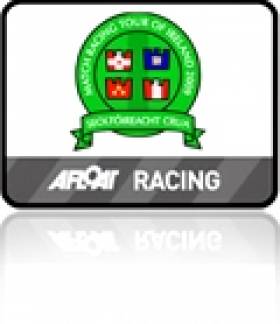Displaying items by tag: St George
Craftinsure Sponsor Royal St. George Junior Event
Dun Laoghaire's Royal St. George Yacht Club has announced that its inaugural Junior Spring Open, sponsored by Craftinsure, will be held on the 19th & 20th of March 2011. This event promises to be a great kick start to the Junior Sailing Season for the Optimist, 420, Feva and Laser Classes.
There will be both Regatta and Main Fleets, Regatta Coaches on the courses and the event will count as an Optimist Pre-Trials and Pre-Regional event. With the ISA Mitsubishi Youth National Championship being held in the same sailing area at the end of April, this event is a great opportunity for sailors from all around the country to get some practise in the local waters.
There will be entertainment for sailors and parents on both evenings, evening dinners and, of course, full Six Nations Rugby coverage on the Saturday throughout the Club. There will also be live-tweeting from the water throughout the event - follow this live action unfold at www.twitter.com/rsgyc.
For further information and to enter online please visit www.rsgyc.ie. The Entrance Fee is €85 for Fevas & 420s and €55 for Oppies & Lasers.
Rejig Means No South Coast Match Racing Fixtures
There will be no match racing on the south coast this year following a rejig of the fixtures calendar.
After two years of expansion for match racing in terms of events the theme for 2011 is consolidation.
Changes to the ISA SailFleet schedule for the boats mean that we have had to go through a rejigging of the match racing calendar.
The major impact is that Royal Cork YC are to take the boats latter than originally hoped meaning that they will be unable to host a leg of the Tour.
With Kinsale not taking part in the SailFleet scheme this year that means no match racing on the south coast for the first time in a couple of years.
With no tie up with the Dun Laoghaire Festival of Cultures available this year a date of July 23rd and 24th has been settled on for the Ireland vs The World International.
The highlight of last year this event will once again pit Irelands 6 best match racers against 6 teams from the rest of the world. Once again National and Tour champion John Sheehy will captain the Irish team.
The Leinster Match Racing Open, to be hosted by the Royal Irish Yacht Club, has been moved to July 16th and 17th to allow it to act as qualification for the Irish team for the following weekend and to give Laura Dillion and the Gladiators (Sam Hunt, Paddy Blackley, Peter Bayly, Richard Murphy) competitive practice immediately before heading over to Poland to represent the country at the ISAF Nations Cup.
Howth Yacht Club's, Dublin Match Racing Open stays with a date of September 3rd and 4th before we head for Lough Derg and the Womens (October 15th and 16th) and Open National Championships (November 5th And 6th).
All of the above means that here will be no Munster Match Racing Open this year and work continues to find a host for the IUSA Student Match Racing Nationals with Galway a potential for early April. There has been considerable work on the cost of entry for events over the winter and the majority of events will have a basic entry of €330 this year. All events will be run at ISAF grade 3.
Revised calendar
July 16-17th – Leinster Match Racing Open, Royal Irish Yacht Club
July 23-24th – Ireland vs The World International, Royal St George Yacht Club
September 3rd and 4th – Dublin Match Racing Open, Howth Yacht Club
October 15th and 16th - Womens Match Racing Championships, Lough Derg Yacht Club
November 5th and 6th – National Match Racing Championships, Lough Derg Yacht Club





























































